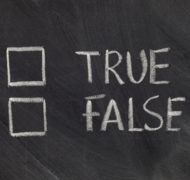Authentic Communication Requires Truthtelling
Article / Produced by TOW Project
Truthtelling is essential for authentic communication to occur, and makes genuine interaction between people possible. That is, if truth were not expected, it would not be long before communication would entirely break down. Imagine what it would be like living in a society in which no one expected the truth. How could a person discern what is accurate and what is a falsehood? On what basis could a person make important decisions if there was no expectation of the truth? Life would be chaotic without the norm of honesty.
This is essentially the view of the philosopher Immanuel Kant, and the principle of universalizability of truthtelling (though he would not support the notion given here that there are exceptions to the universal norm). Kant argued that this principle was the test of a valid moral principle, and used truthtelling as one of his primary illustrations. He insisted that for a norm to be legitimate, it must be universalizable—applicable to everyone. One of his illustrations envisioned what might happen if no one accepted the norm in question. He correctly argued that without a universal norm of truthtelling, the basis for communication would be in jeopardy, and a society in which this was not a norm would not be functional.[1] This is recognized by the fact that virtually every civilization has some kind of norm that promotes truthtelling and prohibits deception.[2]





